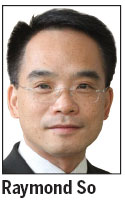Fight smog before it chokes our nation's development
Updated: 2013-02-07 06:11
By Raymond So(HK Edition)
|
|||||||||
The current air quality of our country has caused domestic and international alarm. Smog warnings in Beijing have urged residents to stay indoors as much as possible. If air quality remains in such a dismal state, mounting public health problems could follow.
The roots of the smog problem are myriad. From an economic point of view, air quality concerns cast a shadow on the whole country's economic future. If the smog problem is not solved, China will face strong obstacles to continued economic development.
To many people, industrialization and urbanization are two primary reasons for the worsening air quality. More industries produce more air pollution. Urbanizatio leads to higher population density, higher demand for energy and more cars driving on roads. Worsening air quality is then a side effect of economic development.
When a city is underdeveloped, the focus is always on how to increase the output. Environmental concerns often fall by the wayside; however, economic development at the expense of environmental protection is not sustainable. There are already reported cases of pollution causing long-term diseases, even cancer. When people are more aware of the downside of this form of economic development, they will become increasingly skeptical of more development, no matter if development is environmentally friendly or not. This is not just a theory, but a real concern. Take the case of Hong Kong as an example. In the old days, the city earned fame for efficiency in development. Back then, people were not aware of environmental protection. But eventually, people began weighing the environmental costs of economic progress.

The trendy term "sustainable development" actually refers to the outcome of balancing development and environment. An often neglected impact of over-development is the reversal from one extreme to another.
In Hong Kong, as mentioned earlier, development used to be the only belief. This led to many undesirable impacts, such as overcrowded living spaces. When people started to realize the problems of over-development, many became radicalized, denouncing any further development. Indeed, nowadays environmental concerns may outweigh the need for further development. Whenever there is any development plans in the pipeline, without exception, the media or concern groups will attack the proposals. As a result, public pressure forces the government to spend more time and resources explaining and gaining support from the public. In short, the past over-development has made future development more difficult.
This could also be the case in the Chinese mainland, which has achieved rapid economic development for the past 30 years. The side effects of over-development have started to emerge. The current Beijing smog problem is one of many. If the problems persist, the backlash against economic development could be great. It is foreseeable that future economic development will face much stronger resistance.
In addition to domestic forces asking for a slower pace of economic development, expatriate staff and visitors may also have negative feelings about the worsening environment. Again Hong Kong is a good example to cross-reference. Because air quality in Hong Kong has deteriorated, the attractiveness of Hong Kong in the eyes of international business is diminishing. Many expatriate professionals would prefer Singapore to Hong Kong simply because of the poor air quality. This in turn makes Hong Kong less competitive in attracting international talent. When the smog problem in Beijing is magnified through international media, the same thing may happen. Sooner or later international businessmen may reduce their visits to Beijing and the business environment would then be worsened, too.
The smog problem in Beijing has raised a number of concerns. If remedial strategies are not taken to seriously tackle the problem, the future economic development of the country will face much greater uncertainty. This is not an empty worry but a pressing concern. Hong Kong's experience has proven that environment considerations from both domestic and international sources can hinder economic development.
The author is Dean of the School of Business at Hang Seng Management College.
(HK Edition 02/07/2013 page10)